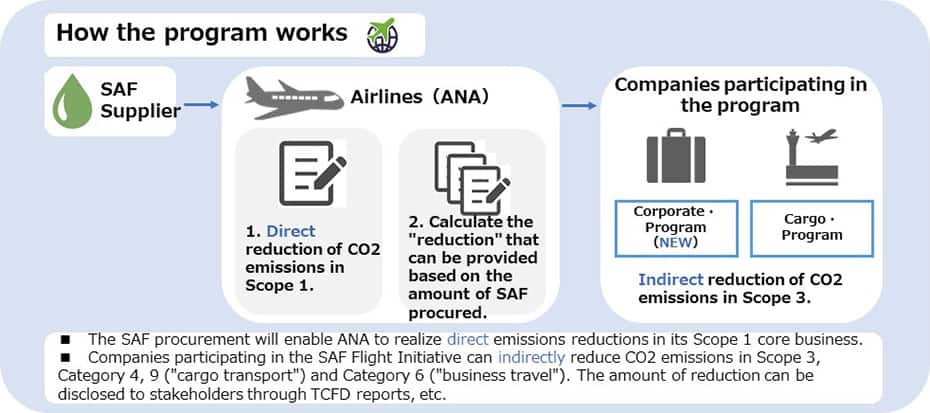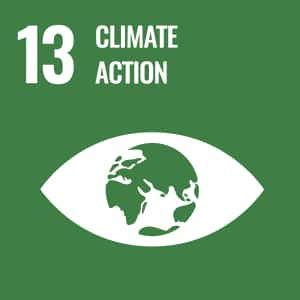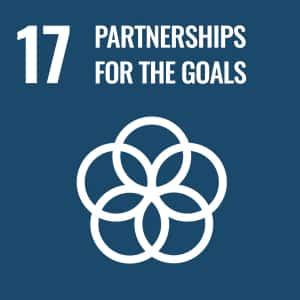2022/12/28
In October 2021, ANA released a new program, "SAF Flight Initiative: For the Next Generation" (*1), which aims to help customers reduce CO₂ emissions in air transportation through the use of SAF (Sustainable Aviation Fuel, hereinafter "SAF") (*2), etc.
Leading companies in various industries that use ANA can receive a CO₂ reduction certificate certified by a third-party organization when they pay part of the SAF costs through this program, thereby contributing to CO₂ reduction throughout their value chains. In addition to the Cargo Program, which targets companies that work to reduce CO₂ emissions from cargo transport, from April 2022 we began offering the Corporate Program, which targets companies that work to reduce CO₂ emissions during employee business trips, so that even more companies can participate in this program.
In this time, we will focus on this SAF Flight Initiative: For the Next Generation corporate program.

- *1 For more information on the SAF Flight Initiative: For the Next Generation program
- *2 SAF: sustainable aviation fuel that significantly reduces CO₂ emissions compared to conventional fuels throughout its life cycle, from production and collection of raw materials such as biomass, waste cooking oil, and exhaust gas, to manufacturing and combustion, and can utilize existing infrastructure as is.
Progress to Date
Since the release of the Corporate Program in April 2022, we have seen a rapid increase in public interest in environmental considerations, and as of the end of November 2022, the program has grown to include five customers, led by Itochu Corporation, Nomura Holdings, Inc., and PwC Japan.
We have interviewed Mr. Inui (ANA Airline Management dept.,decarbonization), the person in charge of the program.

Interview with Mr. Inui, the person in charge of the program
When do you feel a sense of fulfillment and accomplishment?
I have always been interested in the SDGs as a social issue, and I find it very rewarding to work on climate change issues as a company. We have been working on climate change as an issue for the airline industry as a whole since around 2021, and although we are working on the 13th of the 17 goals of the SDGs (*3), "take concrete measures to address climate change", I feel that there are limits to what individual companies can do to address this issue. Therefore, I believe that it is necessary to form alliances and partnerships with the industry as a whole. The issue of climate change falls under number 13 of the 17 goals of the SDGs, and I see it as something that cannot be solved without the spirit set forth in number 17, "Achieve the Goals through Partnership". This corporate program is offered by ANA, but I find it particularly rewarding that we can have a greater impact through partnerships with the companies that actually participate in the program. Although solving climate change issues does not produce immediate and tangible results, I find the process of discussing the same issues with people from industries that have not been directly involved until now to be very worthwhile.
- *3 SDGs (Sustainable Development Goals): 17 common global goals set to fundamentally solve various global problems such as poverty, inequality and disparity, and the effects of climate change, in order to create a better world for all people.
Please tell us about your future initiatives.
I believe that it is necessary for more and more companies to understand once again that addressing climate change is an important issue for their business continuity, and to work together to achieve this goal. Looking around the world, we can see that choosing climate change-conscious transportation is directly related to the brand and value of the company. I feel that our future challenge is to communicate this global trend to everyone and to recruit more companies to participate in the program.

Air transportation has played an important role economically and culturally through the movement of people and goods around the world, but in this day and age when we are required to respond to climate change, some people think that the use of airplanes is shameful. While it is true that operating aircraft emit CO₂ at this time, we would certainly like to offer carbon neutral air transportation in the future by working with many companies to promote the use of decarbonization technologies (SAF).
The ANA Group aims to achieve net zero CO₂ emissions from aircraft operations by FY2050 through the use of SAF.





